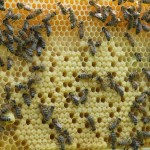In a race to beat the other Stephanie Goldens out there, I got myself an invite to Google+, and secured possession of—my name. A real coup, right? I haven’t learned yet how to use Google+, but once I do, it’ll be a big boost to my career… right?
Not according to computer scientist Jaron Lanier, who says social media just reduce everyone to little more than the database fields they fill in to create their profile. In his manifesto You Are Not a Gadget, he attacks two notions popular among his community of techies:
- the “wisdom of the crowd,” which Lanier calls the “hive mind”;
- the seductiveness of the idea that “bits can be alive on their own”—that is, machines can attain consciousness.
Together, he says, these ideas degrade the concept of personhood, which loses its individuality and (more important, to my mind) the mystery of its being and its spiritual quality. In his book Of a Fire on the Moon, about the NASA space program, Norman Mailer developed a rather mystical notion that machines contained a soul. For him this was a metaphor for what he saw as the heroic man/machine enterprise that climaxed in the moon landing. The contemporary idea that machines can be conscious is just flat—the opposite of heroic, the antithesis of human.
Devaluing individuality wipes out true creativity, which requires the singular vision that arises only from ineffable, individual personhood. That, says Lanier, is why online culture so often just rehashes cultural material from the pre-internet era (really original stuff being in short supply.)
Wikipedia is Lanier’s main example of the way “crowd-sourcing” eliminates the individual voice. It’s always at the top of search results, so people click the Wikipedia link, missing more original, ambitious material.
The flattening of individuals into a “hive” also undermines the concept of authorship. To me—an author—this is the true horror. There’s a notion that all books should become “one book” once they’re digitized and put online. Then anyone can take any fragment out of context and “mash” it with any other fragment. Lanier makes the very good point that online mashups destroy the original context in which a work is made, which then destroys their meaning.
In terms of my Venn diagram, the inspiration circle simply falls out of the picture. A whole piece of my personhood is gone. Once I figure out how to use Google+, will I just be buzzing around the global hive, as my mind melds into a single worker-bee brain?

